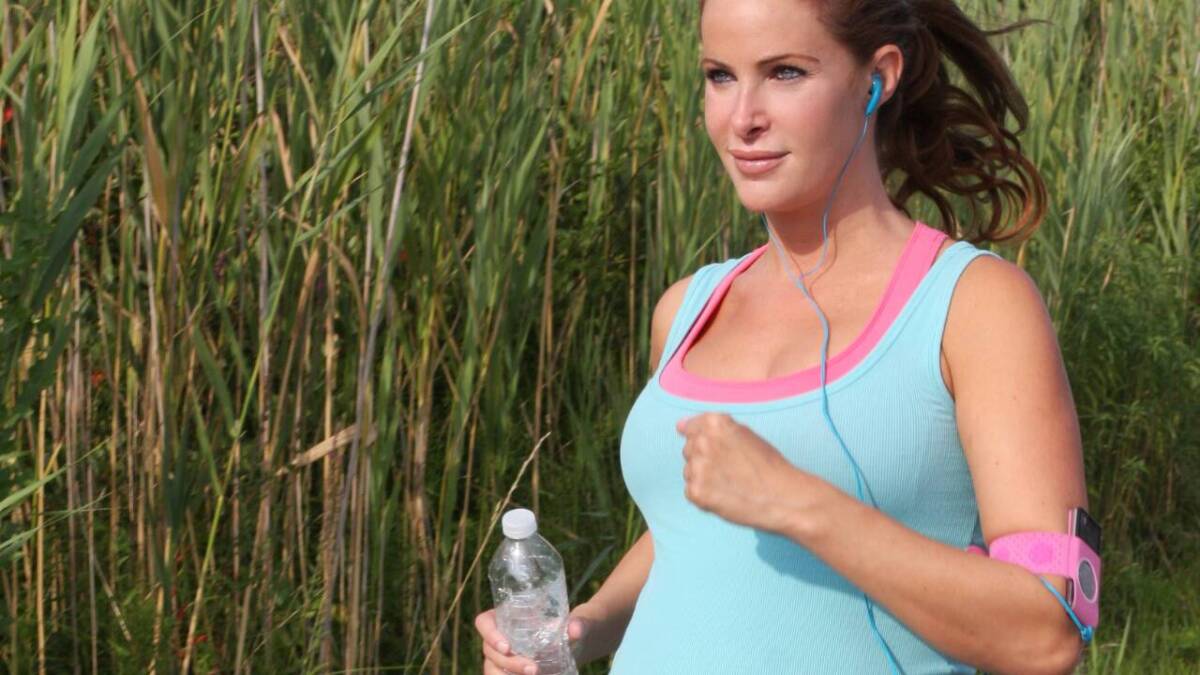Can You Drink Electrolytes While Pregnant?
Can you drink electrolytes while pregnant? Yes. Not only should you drink electrolytes while pregnant, electrolytes are essential to meeting the increased fluid demands that accompany pregnancy along with increased kidney function. Electrolytes may also decrease common pregnancy symptoms such as fatigue and nausea. Read on to learn about the importance of electrolytes during pregnancy.

First, the basics. What are electrolytes? Electrolytes are minerals (potassium, sodium, calcium, and magnesium) with an electrical charge that helps transmit nerve impulses throughout the body. They are vital to functions such as fluid balance, blood flow, blood pressure, bone health, and hormone secretions.
Like most other nutrients, the need for electrolytes increases during pregnancy.
Skip Ahead:
As humans, we need electrolytes. As runners, we definitely need electrolytes. And as pregnant runners, we need electrolytes even more.
When I coach a pregnant runner, one of the most important things we focus on is her hydration plan. Her fluid and electrolyte needs are simply higher than a non-pregnant runner and so is the risk for dehydration. With this in mind, we draft a hydration plan that includes drinking electrolytes before, during, and after her run. Read on to learn everything you need to know about electrolytes and pregnancy: why, what, how, and how much. Let’s go!
Importance of Electrolytes During Pregnancy
Why do you need electrolytes during pregnancy? First, your body needs more fluid to support a growing fetus for the amniotic sac around the baby and fluid near the cervix. Your baby also takes some electrolytes from you.
Additionally, electrolytes help relieve pregnancy symptoms such as headaches, fatigue, muscle cramps, nausea, constipation, swelling, and even postpartum depression.`Also, Dr. Jaclyn van Nes, OB-GYN, and mother runner, explains that pregnancy, especially in the second trimester, has an increased function of your kidneys. The glomerular filtration rate (how fast blood is filtering through your kidneys) peaks at about 40-50 percent above baseline. This can lead to getting dehydrated much more quickly than usual and more frequent electrolyte imbalances.
On average, your total electrolyte needs increase by about 10-20 percent during pregnancy. For this reason, drinking an electrolyte drink during pregnancy can help you ensure you are getting enough of these vital minerals.
Let’s take a look at the key electrolytes and how much electrolytes you need during pregnancy:
- Potassium helps regulate fluid levels inside our cells and lower blood pressure because it helps remove excess sodium. Recommended dietary intake (RDI): 2,600mg for non-pregnant and to 2,900mgfor pregnant
- Sodium helps regulate fluid levels outside cells; and transport vital nutrients into your cells like amino acids, glucose, and vitamins. RDI: 2000 mg
- Calcium is responsible for strong bones, blood vessel dilation and contraction, blood clotting, and hormone secretion. RDI: 1,000mg for women and increases to 1,200 mg for pregnant and lactating women.
- Magnesium is required for synthesizing amino acids and regulating blood sugar levels and blood pressure. RDI: 300–310 mg for non-pregnant and 350–400 mg for pregnant women.
Additionally, pregnant women need more fluids on average than non-pregnant women. The American College of Obstetrics and Gynecology recommends that pregnant women have 64 to 96 ounces, or 18 to 12 glasses, of water a day.
Your needs increase if you are running while pregnant. Add about 16-24 ounces of fluid daily for every hour that you are running—more if it is hot.
Your needs for more hydration and electrolytes also increase if you are suffering from morning sickness. Being well-hydrated with enough electrolytes will help fight fatigue and nausea.
Safety of Electrolyte Drinks for Pregnant Women
The risks of drinking electrolyte drinks for pregnant women come with what is added to the electrolyte drinks. You want to avoid drinks that are high in sugar, artificial sweeteners and flavors, food dye, and have caffeine.
Pregnant women also need to be aware of how much sodium they are taking in, especially relative to how much potassium they are taking in as both balance each other.
Research finds that pregnant women who had more than 3,700mg of sodium a day had a 54 percent greater risk of high blood pressure and a 20 percent increased risk of preeclampsia than those who had less than 2,600 mg of sodium daily.
Even if you are supplementing with sodium to meet your training needs, you will likely not need to surpass that 3,700 mg mark. However, if you are running for long durations, you will sweat out sodium so it may be close.
Drinking water with electrolytes can help you stay hydrated and replenish lost minerals that help your body function properly and help support a healthy pregnancy.
Below are safe electrolyte drinks pregnancy that contain no sugar added or artificial anything:
- LMNT
- Skratch Labs Hydration Everyday
- Gnarly Hydrate
- Needed pregnancy hydration packets
- Nuun Hydration
Of course, always talk to your doctor before trying any supplement, even if deemed these are electrolyte drinks safe for pregnancy by a third-party tester.
Alternative Ways to Get Electrolytes During Pregnancy
In addition to drinking pregnancy hydration packets, you can get electrolytes from the foods you likely eat already including:
- Milk
- Cheese
- Salmon
- Chicken
- Sunflower Seeds
- Almonds
- Vegetables
- Coconut water
- Bananas
- Avocado
- Pumpkin Seeds
- Spinach
- Dry-roasted sunflower seeds
- Pickles (and ice cream!)
- Salt your food
More Tips for Staying Hydrated During Pregnancy
Even if it means joining the Stanley cup, having a water bottle close to you at all times will remind you to keep drinking. Using hydration tablets will make it easy to drop in and get those electrolytes.2. Track your hydration.
An app such as Waterllama or Waterminder can help you ensure you’re getting enough but not too much hydration and electrolytes.3. Set a goal.
If using an app isn’t your thing, set a goal to drink x number of your water bottle a day with a x number of hydration tabs.4. Have a running hydration plan.
If you are running, make sure you have a hydration plan in place which means drinking:
- Pre-run: at least 16 ounces of fluids with about 400 mg of sodium pre-run.
- During your run: at least 16 ounces of fluids with about 400 mg of sodium during each hour of running.
- After running: you want to drink in fluid the amount of pounds you lost. So, if you lost one pound of water weight, drink 16 ounces of fluids.
5. Eat electrolyte-rich foods.
Check out the list above and aim to have at least one of those food items in each meal and snack. Eating foods heavy in water contents like watermelon and cucumber can also ensure you are well-hydrated.6. Be smart.
If you are running in hot weather, avoid running in the hottest part of the day, wear light layers, bring a water bottle with ice, and cut it short as needed.
Do Electrolytes Keep You Awake?
No, electrolytes do not keep you awake because electrolytes are not stimulants. In fact, electrolytes could help you sleep better.
- Magnesium, in particular, has been shown to promote good quality sleep.
- Low sodium has been linked to restlessness.
- Potassium helps promote healthy circadian rhythms.
- And calcium is connected to deep sleep regulation.
When to Drink Electrolytes for Running
Below is a hydration plan for runners that is a guide, not a rule, as you will need more or less depending on factors such as sweat rate, duration and intensity of exercise, and weather.
I’ve worked with many registered dietitians, such as Amy Stephens, who always stress the importance of starting a run hydrated, and then maintaining hydration as much as you can. “Oftentimes, athletes start dehydrated and then focus on catching up,” she notes.
When to Drink Electrolytes Running:
- Before your run: 1-2 hours before your run, aim to drink 16 to 18 ounces of fluids with 400 mg of sodium. If you aren’t running in the morning, 4 hours before your run, shoot for 16 to 24 ounces of water with 400 mg of sodium.
- During your run: Aim for 2 to 5 ounces of fluid (or two big gulps) every 10 minutes of running. Shoot for 400 mg of sodium an hour.
- After your run: Know your body weight before your run (and before you hydrated) to know your pre-run weight. Aim to drink 16-24 ounces per pound of body weight lost with least 400 mg of sodium after your run.
- While the other electrolytes are important, sodium is especially important because we lose it as we sweat. Most electrolyte drinks and tablets include other electrolytes as well.
Learn more here: Hydration for Runners: An RD’s Complete Guide.
Can You Drink Electrolytes at Night?
Yes, you can drink electrolytes at night. Bonus if your electrolyte drink has magnesium which has been shown to promote sleep quality.
You will want to drink electrolytes at night before going to sleep especially if you are going to run in the morning. You don’t drink any or much water in the middle of the night while sleeping, so hydrating at bedtime will help you avoid becoming dehydrated.
What about electrolytes in the morning? As noted, you naturally wake up a bit dehydrated from sleeping all night so drinking electrolytes in the morning (especially before running!) is wise.
Electrolytes and Pregnancy, Recapped
Hydration is important as a human being, especially one who is active, and ESPECIALLY one who is pregnant! Fluid balance is vital for your health and the health of your baby. Dehydration comes with risks for you and your baby’s development, so stay on top of your daily intake.
Don’t overcompensate which can be dangerous as well. Stick to the guidelines mentioned above and pay attention to how you feel. Any signs of discomfort or something out of the ordinary such as dizziness, vomiting, dark urine, not sweating in hot weather, call your doctor immediately.
Your body is smart and will tell you what you need. So, listen to it always. If you want extra guidance with your running while pregnant goals, I would love to help you! Learn more about my run coaching here.
Did you change your hydration habits while pregnant?






